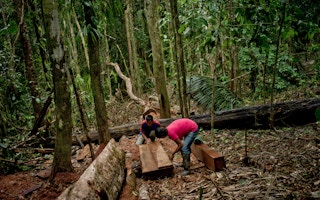Indigenous leaders from rainforests from Brazil to Indonesia say a new European Union law preventing the import into the bloc of key commodities linked to deforestation is insufficient to protect forests and will do little to bolster indigenous rights.
The legislation, agreed upon last week, will force firms supplying palm oil, cattle, soy, coffee, cocoa, timber and rubber - as well as some derived products such as beef or furniture - to the EU market to prove their supply chains are not fuelling the destruction of forests.
Brazilian indigenous leader Dinamam Tuxa said the law would help stem rising rates of deforestation across most of the Amazon basin - which spans nine nations including Brazil - but stressed that he did not think it was broad enough in scope.
The legislation does not cover deforestation from biodiverse areas outside of rainforests, such as wetlands, semi-arid forests, and savannahs that are also major carbon sinks and help to stave off climate change, according to Tuxa.
“This law should have been more ambitious. It leaves behind other important biomes,” said Tuxa, head of the Articulation of Indigenous Peoples of Brazil (APIB), an indigenous umbrella organisation.
For example, products from 600,000 square kilometres (231,600 square miles) of land in Brazil’s Cerrado savanna - the fastest growing frontier of agricultural expansion in the country - would not be subject to the law, said the Cerrados Institute, a non-profit.
An EU commission will consider no later than one year after the law comes into force whether to extend the regulations to include other wooded land, and within a period of two years if the law should also be broadened to include other ecosystems.
Deforestation is responsible for about 10 per cent of global greenhouse gas emissions, according to climate scientists, and it is on the agenda at this week’s UN COP15 summit in Canada, where countries are seeking a global pact to protect nature.
Indigenous leaders said they are concerned that national laws protecting indigenous rights and local deforestation monitoring systems are not strong enough on their own to ensure the new EU law will be effectively implemented on the ground.
In Brazil, government agencies that can help monitor, verify and trace company supply chains to ensure compliance with the EU law must be strengthened after years of being undermined and underfunded by outgoing President Jair Bolsonaro, Tuxa said.
“
Our rights are violated. The (EU) law isn’t going to change much for us in terms of access to justice and guaranteeing our rights.
Levi Sucre, indigenous leader, Costa Rica
“There are many [government] monitoring mechanisms already in place in Brazil but nothing is working,” he said.
Brazil’s main environmental federal government enforcement agency, Ibama, and the indigenous affairs agency, Funai, have been particularly affected, he said.
‘Come up short’
The European Parliament’s lead negotiator Christophe Hansen has hailed the new EU measure as “innovative regulation”, and green groups hope it will significantly help protect fast-vanishing forests around the world.
Hansen’s office was unable to respond to a request for comment by deadline to criticisms of the EU law from indigenous leaders.
But in a statement following the announcement of the new law Hansen said “the rights of indigenous people, our first allies in fighting deforestation, are effectively protected.”
The legislation requires companies to produce a due diligence statement showing their supply chains are not contributing to the destruction of forests before they sell certain goods into the EU. Those who do not comply risk fines.
Although firms have to show that the rights of indigenous people were respected in their operations in commodity-producing nations, campaigners have raised concerns that this only applies to countries where those rights are already protected by national law.
Levi Sucre, an indigenous Bribri leader from Costa Rica, said he welcomed the EU law and its potential to tackle Latin America’s “alarming deforestation rates,” driven largely by the expansion of the agricultural frontier and monoculture farming.
But the legislation was “fragile”, he said, noting he feared it would put little extra pressure on governments in commodity-producing countries to ensure they respect the rights of indigenous people.
Across many Latin American countries, the rights of indigenous people are enshrined in state constitutions and local laws but are still too often flouted and ignored, Sucre added.
“Our rights are violated. The (EU) law isn’t going to change much for us in terms of access to justice and guaranteeing our rights,” said Sucre, who heads the Mesoamerican Alliance of Peoples and Forests (AMPB).
“There are shared economic interests between governments and companies. Who will verify that our rights are respected? That’s the big question,” Sucre said.
Indigenous rainforest leaders in Indonesia - the world’s top producer of palm oil and a leading exporter of coffee, rubber and cocoa - said national laws to protect the environment and indigenous land rights are not being implemented in practice.
The Global Alliance of Territorial Communities (GATC) - an alliance representing tropical forest peoples from more than 14 countries - said its indigenous leaders and members were “disappointed” the EU had not sufficiently strengthened their rights in its new legislation.
“The EU have placed our fate in the hands of the very governments that have violated our rights, criminalised our leaders and allowed an invasion of our territories,” the group said in a statement.
This story was published with permission from Thomson Reuters Foundation, the charitable arm of Thomson Reuters, that covers humanitarian news, climate change, resilience, women’s rights, trafficking and property rights. Visit https://www.context.news/.








